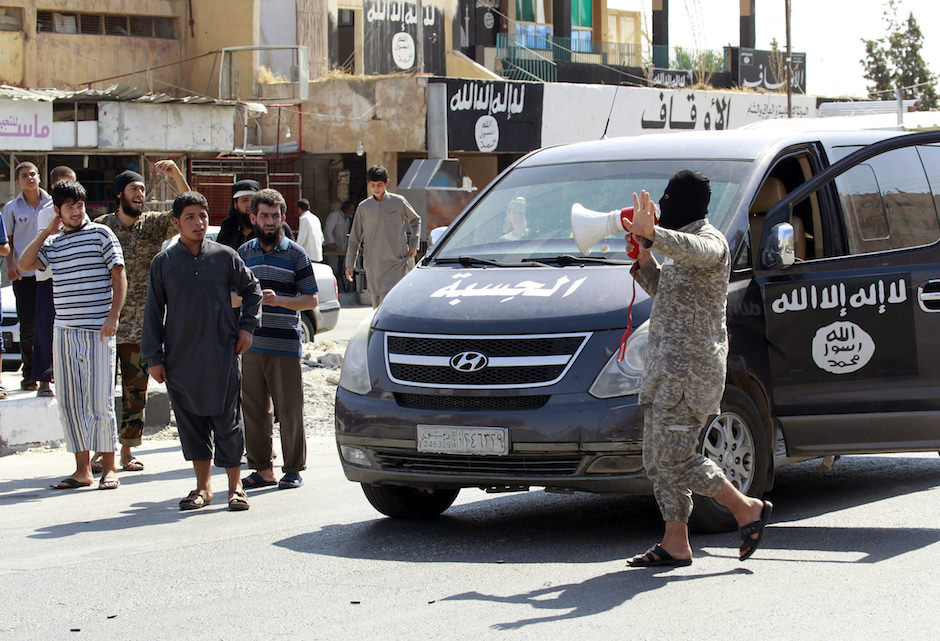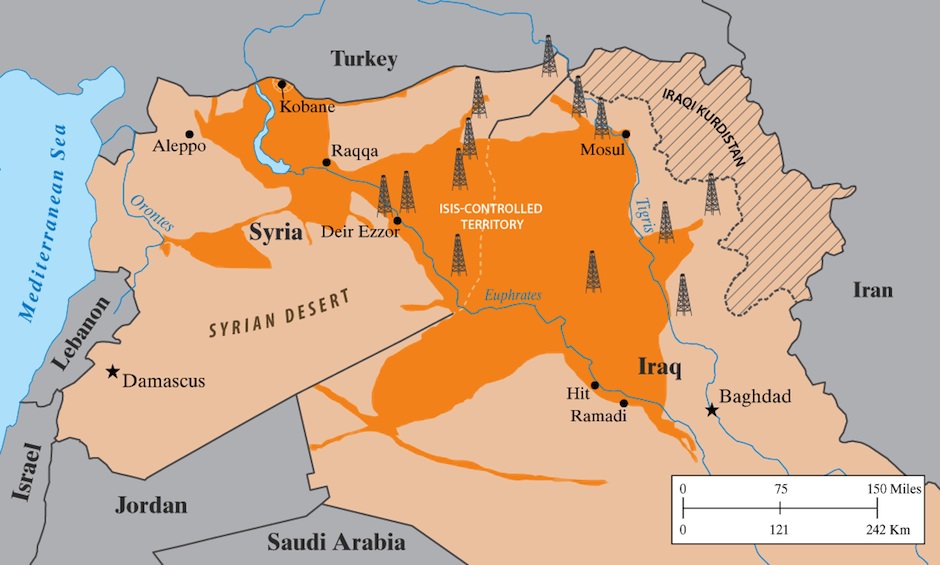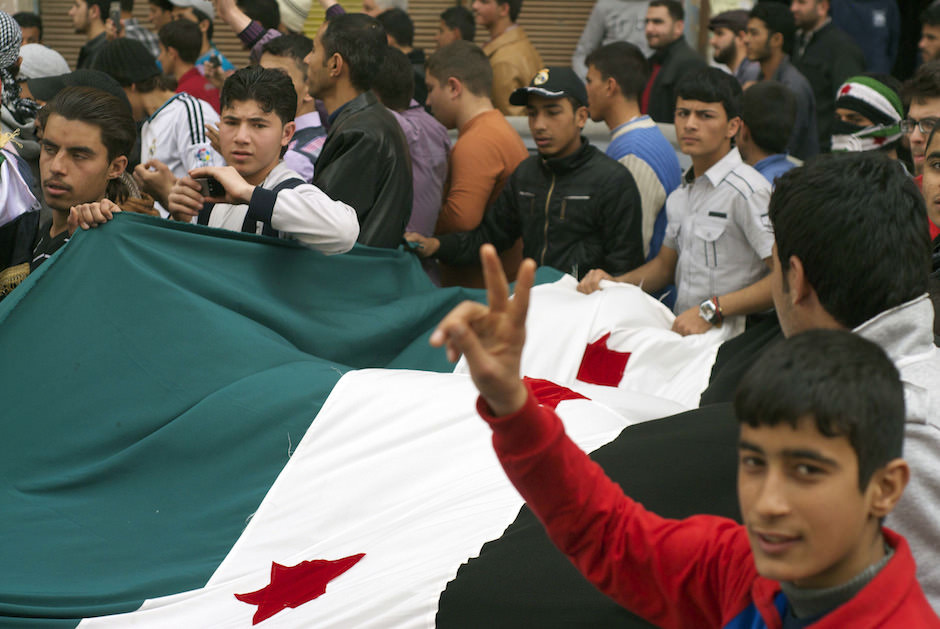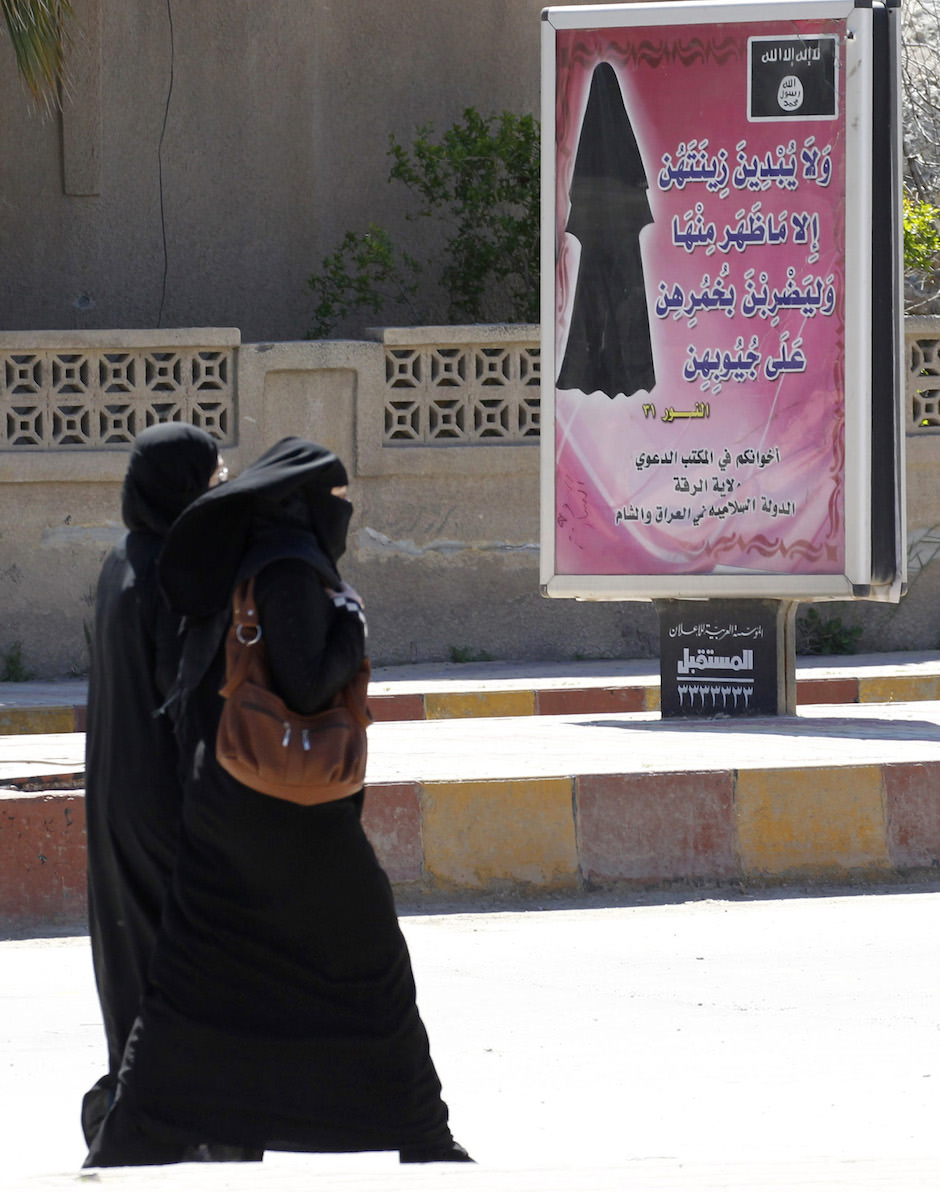In late November, there were widespread reports that both the US-led coalition and the Bashar al-Assad regime in Damascus have stepped up their bombing campaign against the ISIS stronghold of Raqqa, in eastern Syria. The jihadist organization has long been secretive about where its leader, Abu Bakr al-Baghdadi, and other senior members are based—locals say they move around between Iraq and Syria—but Raqqa is often referred to as the “capital” of ISIS’s self-declared caliphate, and has become its most emblematic city.
To judge from images distributed by the group, Raqqa is an extremist hotbed whose inhabitants crave a radical version of Islam, enjoy public executions, and fervently support their ruthless black-clad overlords; the beheading of James Foley—and of several of the other hostages—was filmed on a hill in its outskirts. Yet there is little about this provincial center of some 500,000 people that might have suggested jihadist or even Islamist tendencies. In fact, Raqqa did not even enter the Syrian conflict until 2013.
Living in Damascus before the war, I had several occasions to visit Raqqa, and I was struck by how ordinary it was. A dusty place far from the country’s other major cities, it offered few amenities and most Syrians complained about it, if they chanced to visit. It was true that the local population, a mixture of tribes and settled Bedouins, were almost entirely Sunni Muslim, but unlike such eastern cities as Hama and Aleppo it didn’t have a tradition of Islamist activism. As a resident of al-Tabqa, a town near Raqqa with a Syrian air base that was captured by ISIS in August, put it: “The irony is we were famous for not praying!”
But Raqqa’s substantial size, location, and relative remove from the main areas of conflict have been critical to ISIS’s aim of creating a large and highly centralized state. The group holds territory that now extends from the outskirts of Aleppo in Syria’s west to Iraq’s Iranian border in the east, from the Syrian-Turkish border in the north down through Iraq’s Anbar province to six miles outside of Baghdad in the south. Although its forces have been pushed back, slowly, from Kobane, on the Syrian-Turkish border, they have also won land elsewhere, including at Heet and Ramadi in Iraq, despite US-led bombardment.
Since June ISIS has consolidated control over Iraq’s second-biggest city, Mosul, and some analysts think that it has become the group’s new capital. But in Mosul, which has a population of more than a million people, there is still a degree of power-sharing with other Sunni groups, and in many parts of Iraq ISIS faces military threats from Shia militias, the Kurdish Peshmerga, the ragtag Iraqi army, and some Sunni tribes, as well as the US-led coalition.
By contrast, even before ISIS gained control of eastern Syria, the Syrian regime had largely abandoned the area to focus on the more populated western areas of the country; and it largely left ISIS undisturbed once the group was in power (ISIS’s growth was helpful to Damascus’s efforts to portray the opposition as “terrorists”). For ISIS’s foreign recruits, who often cross into Syria from southern Turkey, Raqqa is also relatively easy to reach. Although coalition strikes and the regime’s recent raids have now made life for its inhabitants more difficult, the city has become a crucial power center in a territory that is now bigger than many countries and includes some 6 million to 8 million people. “There is still the sense that Raqqa is the capital,” said Sarmad Jilani, a Turkey-based Syrian exile and coordinator of “Raqqa is Being Silently Slaughtered,” an activist group that has correspondents in the city.
ISIS’s leaders, who include a number of former Iraqi Baathist military men as well as veteran jihadists, are known to use several buildings in Raqqa such as the governor’s palace, the municipality, and the Armenian church of the martyrs, and they wield tight control over areas outside the city such as Division 17, a former army base, and oil installations, where many of the group’s Western and other hostages subsequently executed or released for ransom were held. A division has been made between ISIS’s military and civilian arms, and alongside its military and security forces, there are ministries run by ministers, although they appear not to have physical central locations. The group has set up new courts, local police forces, and an extensive economic administration, while taking over the existing education, health, telecom, and electricity systems (with some utilities still supported by the Syrian government).
Advertisement
According to ISIS’s strict interpretation of sharia law women must wear a niqab, men must not have pictures on their t-shirts, smoking is banned, shops must shut for the five prayer times (as happens in Saudi Arabia), only women can work in women’s clothes shops. Since August women need a mahram, a male companion, to go out. Adherence to the rules is monitored by an all-women brigade called al-Khansa and a male Hisbeh force—two women from the city told me Saudi members, who come from a country with the version of Islam closest to the ISIS worldview and that has religious police, are often the most vocal about moral transgressions.
Raqqa has also been a model for ISIS’s system of taxation: shopkeepers from Raqqa told me the group takes 2.5 percent of their revenue, deemed zakat, the alms payment in Islam, and 1,500 SYP monthly fee (it is never described as a tax). ISIS now collects around 400 SYP per month for telephone lines, even though the costs are borne by the regime. Locals also report that salaries are regularly paid by a new state office to both civilian workers and fighters, who may get $400 or more per month, and that prices of goods are tightly regulated by the government.
All this would have been difficult to imagine as recently as two years ago. Although there had been some protests when the Syrian uprising began, Raqqa had remained fairly loyal to the Assad regime, partly because of Damascus’s patronage of local tribes, partly because the large number of displaced Syrians who came to the city during the opening years of the conflict were not intent on rebellion. In March 2013, however, mainly Islamist rebel militias, including the devout Ahrar al-Sham and Jabhat al-Nusra, al-Qaeda’s Syrian branch, seized Raqqa from the Assad regime. The takeover came from outside and many locals were unhappy about this.
When I visited the city two months later, in May 2013, the black flags of Jabhat al-Nusra were hanging along the street close to the governor’s office, which it then occupied, but no one group controlled the city. The militias that remained were more intent on wooing locals, and competed for space with local moderate activists who continued to work toward democracy. Although the Alawite minority was closely associated with the Assad regime, one could still see the tolerant outlook Syria had been known for; for example, I met an Alawite nurse who was open about her sect. (In Raqqa today, she would be beheaded just for her faith.) A municipal council headed by a lawyer was having considerable success keeping city services going, ensuring that street cleaners were paid, and maintaining an ambulance system. Many locals reveled in their newfound freedom. Graffiti and art projects were everywhere.
But competition between armed groups and lack of consistent funding to the council prevented a full-fledged local government from taking shape. This gave the upstart ISIS a signal opportunity to capture a major city. At the time an offshoot of al-Qaeda in Iraq, ISIS—or the Islamic State of Iraq and al-Sham—officially entered the war in Syria in April 2013, shortly after Raqqa fell, by declaring it was merging with Jabhat al-Nusra, the group that had earlier been designated to fight in Syria by al-Qaeda in Iraq. But Jabhat al-Nusra refused the merger, and ISIS already had different priorities: unlike Nusra, ISIS immediately made clear that its primary aims were not to fight Assad but to hold territory and immediately impose Sharia rule—and it was willing to use more brutal tactics than al-Qaeda to achieve them. (Along with Nusra, al-Qaeda’s senior leadership has also since broken with ISIS.)
In August 2013, ISIS forces launched a brutal attack on other rebel groups in Raqqa, rapidly taking control of the city as the other militias withdrew. Now ISIS controlled a provincial capital rather than just small villages and towns, and it became the group’s headquarters. It set up bases in Raqqa, manned by Syrians and Iraqis as well as numerous foreign fighters; more flocked in as the city gained notoriety. They have continued to come since ISIS, renaming itself the Islamic State, declared its “caliphate” after taking Mosul in June 2014.
During the initial phase of ISIS rule, locals told me they disliked the excesses of the Islamic State, but some were pleased that the corruption and chaos of rebel rule had ended. One businessman from Raqqa who now lives in Turkey told me that, though he hated the group, it was easier to ship goods through ISIS territory because the checkpoints did not take bribes like other rebel groups. The group was also pragmatic in running municipal services in Raqqa, keeping expert employees in position, including in government-run services such as the phone network, but making clear they now work for the Islamic State. Schoolteachers are allowed to continue to teach, but with an altered curriculum that has had subjects such as chemistry and French removed and Islamic studies added. A junior doctor in her twenties, who went into exile in September, told me how the department heads in her hospital in Raqqa had been replaced by Islamic State men—complete with titles such as Emir of General Medicine. Female doctors were now only allowed to treat female patients, and in full niqab. “How am I meant to operate in black gloves and with barely my eyes showing?” the doctor asked me.
Advertisement
But it quickly became clear that ISIS’s ability to maintain power depended overwhelmingly on outright repression. Although the beheadings of two American journalists and one aid worker, and two British aid workers have caught headlines, far more Syrians and Iraqis have been murdered by the group and scores have been tortured. Abu Hamza, a Syrian defector from ISIS’s intelligence services, told me that the will of the state is primarily imposed by security services, just as it was under the Baathist regime in Iraq and continues to be in Assad’s Syria. ISIS’s security forces, he said, are a mix of nationalities but include enough Syrians who know others’ pasts. “They look at all the threats to Islamic State, from Bashar al-Assad to America and the other rebels—but their number one enemy is the [mainstream] rebels,” he said.
Residents said they were terrified of the group’s horrific punishments. In a central square in Raqqa, heads are posted on spikes with a sign above them indicating what transgression was involved. The square used to be called Sahat al-Naem, or paradise, but is now dubbed with the rhyming Sahat al-Jaheem, or hell; the doctor I met told me she took a route to work that took three times as long just to avoid it. None of the Raqqans I talked to was sure whether ISIS’s sharia courts actually listen to evidence, but several noted that gruesome punishments are sometimes meted out on the spot to instill fear. A former teacher from Manbij, an ISIS-controlled town north of Aleppo, told me, almost in disbelief, how he watched the beheading of a man who had accidentally driven into ISIS territory while smoking and then tried to claim it was not banned in Islam after being caught. Militants then jumped into the man’s car and ran over his head, he told me.
Though the group is unable to electronically monitor the Syrian regime-controlled phones and Internet, it gathers information about everyone, does spot checks on phones, beheads anyone caught filming (hence the dearth of images from the city), and has members monitoring goings-on in public places. Many Syrians told me they had deleted photos and music from their phones for fear of being caught.
Months ago Raqqans began describing how foreign jihadists were bringing in their families, or marrying Syrian or foreign women—who have been drawn to ISIS in greater numbers than to any previous jihadist movement—and setting up homes in the city. The Islamic State distributes housing to fighters, and according to some accounts, widows receive welfare benefits based on how many children they have. Recent footage filmed by a woman who hid her phone in her niqab showed French women in an Internet café telling their families they would not be coming home. In a city where once neighbor knew neighbor, now many can’t even speak the same language, the doctor told me. “By the time I left I no longer recognized Raqqa as a Syrian town.”
It is unclear where the Islamic State’s videos and English-language magazine Dabiq are created, but residents in Raqqa describe high-tech equipment in the city—local shops sell satellite Internet connections since that is the only way to get online. Abu Hamza told me that an Icelandic filmmaker was among the recruits to the group, hence the professional videos used to attract new recruits and scare Western viewers. Dabiq’s fluent language suggests it is written and edited by native English speakers.
Despite all this expertise from abroad (Abu Hamza also told me there are Chinese experts in drones and Egyptian hackers, for example), several people from Raqqa said that ISIS is failing at ruling, particularly since coalition airstrikes began this fall. “Electricity comes almost never so everyone uses a generator, water is scarce when there is no power for pumps, medical care is worsening, most schools are shut and rubbish lies on the street,” a mother of two from the city told me in southern Turkey last month.
American-led airstrikes appear to be doing more damage to ISIS’s ability to govern than to its military strength (although it can no longer run convoys across the desert openly without worrying about being hit). The airstrikes have hit at least sixteen oil refineries, compromising a main source of funding of the Islamic State—but only in Syria, because the Iraqi government doesn’t want to ruin its oil infrastructure. The people from Raqqa told me that in the days after airstrikes Islamic State fighters melted back into the population, making them harder to target, but relieving some of the repressive apparatus, such as checkpoints, in the city. Only in the evenings did the group come back out, to tell residents that America’s campaign was a war against Islam.
Some residents said that until the US-led airstrikes, you were safe if you followed the rules, however perverse, which were posted up on walls and circulated quickly by word of mouth. But the airstrikes have made ISIS more paranoid and prone to kidnapping people randomly, the women told me. Some say ISIS’s leaders are trying to entrench their control of the local population by “Syrianizing,” finding local leaders as they have done in Iraq. Abu Hamza said that the prospect of getting promoted to positions of responsibility within the group has helped it attract more Syrians—he admitted this had been appealing to him when he joined ISIS. In addition, Jilani, the Raqqan activist, told me that since late November when the regime began bombing Raqqa—mainly civilian areas rather than ISIS bases—locals have become more sympathetic to the group, seeing them as the only defense against Damascus.
Many people wonder why those under ISIS rule don’t revolt. After all, Raqqa’s earlier history under the Assad regime and during the initial months of rebel control suggests that much of the city’s native population would be glad to return to a more secular government. Moreover, Sunnis rising up against ISIS is, after airstrikes, the second pillar on which the American strategy against the group rests. But the people I met from Raqqa said they are too afraid to rise up. They point out that local protests against the regime and then, in the months after the group’s takeover of the city, against ISIS ended in massacre. When some seven hundred members of the Shaitat tribe rose up in August against ISIS in Deir Ezzor province they were slaughtered, but no one paid any attention. The moderate opposition, meanwhile, has been eliminated in ISIS-controlled areas and is being snuffed out elsewhere thanks to a lack of support and funds.
Some Syrians living under ISIS rule told me almost all they believed they could do now was silently resist, much as they had under Bashar al-Assad; whispered conversations in houses, watching “un-Islamic” television programs at home, putting on music as soon as they exited ISIS territory. When I asked a grandmother from Raqqa whose sons had fought with the mainstream rebels who she would choose between Assad and ISIS were they the only options left, she said neither—she, like many, has subsequently left the country for good. Abu Hamza, by contrast, said ISIS was rapidly becoming the only option for Sunnis in Syria who didn’t want to reconcile with the regime. ISIS may be failing in its attempt to govern, but for now there is nothing else in sight.






